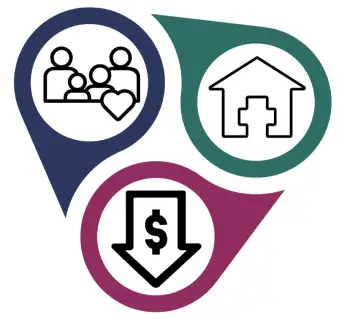Through care coordination, health plan members receive optimal care, providers are better informed, and there is less wasteful spending on things like unnecessary testing or duplicative procedures. Minnesota’s Managed Care Organizations (MCOs) provide this service to targeted populations free of charge, whereas under Fee-for-Service (FFS), care coordination is not a covered benefit.
Care coordination improves how the healthcare system works for people by improving clinical outcomes, making care safer and more efficient, and lowering costs
Benefits of Care Coordination
Member-Centered Care
Members know that there’s always someone they can call when things get hard. From the initial face-to-face assessment, care coordinators work with members to identify their goals and needs, connect them to additional resources as their circumstances change, and make sure they’re receiving the care they need in an efficient and safe way.
Improved Care Transitions
Aging in place and remaining in the community offers numerous benefits, including mental, physical and monetary. People using supports to stay at home report lower depression, greater independence and self-reliance, and better clinical outcomes, among other benefits. Care coordinators work with hospitals, long term care facilities and at-home care providers to ensure everything is ready to go when the member is discharged.

Lower Hospital and ER Utilization
A study of Texas Medicaid enrollees found that patients receiving care coordination had a 19% lower probability of hospitalization relative to patients who didn’t, for a mean savings of approximately $1,500 per year per patient. Another study found that care coordination directly reduced 30-day readmission rates, which is also a strong indicator of higher quality care. More recently, a hospital system in Wisconsin found that for every $1 invested in care coordination for their highest-risk population, the hospital realized an $8 reduction in health care charges. When managed appropriately, inpatient visits were less frequent, less critical, and were, on average, 30% shorter.
Addressing Social Drivers of Health: Care Coordinators' Stories
Helping members age in place
The benefit of care coordination is to keep people in the community for as long as possible. The importance of preventing or delaying nursing home placement is huge. Not only do people want to remain in their own home, they’re more comfortable, they’re more autonomous, they’re more independent. It’s just a winwin for everyone if people can remain in the community setting.
Jan Hubert, HealthPartners

Connecting members with resources
A lot of [members], when you first start working with them, just don’t realize that not only do we help with the healthcare side of things, and the appointments, and the transportation, but we can also help with homemaking, if they’re really struggling keeping their home clean. And the delivered meals are huge, knowing that they have a warm meal a day that is coming to them. [They’re] thankful that they have a person that they can reach out to if they need to.
Sheila Pettis, Medica

Tailored support to meet member needs
My position exists primarily to serve transgender and gender non-binary members. So, that’s very unique. I make a difference in their lives because I’m there to serve them. And that’s not something that I think trans and non-binary folks are used to, having somebody there specifically to recognize that they’ve been struggling for years inside of the system and to actually help them through it.
Alex Jackson Nelson, Blue Cross Blue Shield of MN

Removing barriers to care
A lot of times [members] come to us and haven’t seen a doctor for many years and don’t even know who to call. Getting transportation to and from medical appointments is a challenge for a lot of seniors, or people with special needs, who aren’t driving anymore and maybe don’t have a family member or friend that can transport them.
Sheena Black, Medica
